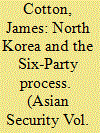| Srl | Item |
| 1 |
ID:
080144


|
|
|
|
|
| Publication |
2007.
|
| Summary/Abstract |
Dissuading proliferators from developing nuclear weapons entails application of the global nonproliferation norm. Insomuch as proliferators' motivations to develop nuclear weapons are embedded in regional security concerns, security assurances taken for nuclear disarmament would include measures addressing these regional security concerns. Such measures are compatible with the need not to motivate other proliferators to develop nuclear weapons. The September 2005 Joint Statement of the Six-Party Talks incorporated a pledge to build a peace regime on the Korean Peninsula, which demonstrated the link between the regional undertakings and North Korea's denuclearization process. North Korea's nuclear test is no doubt a deviation from the document and the international community must retain collective sanctions. However, building a peace regime remains an effective means for defusing the nuclear standoff
|
|
|
|
|
|
|
|
|
|
|
|
|
|
|
|
| 2 |
ID:
080143


|
|
|
|
|
| Publication |
2007.
|
| Summary/Abstract |
Since North Korea is one of the world's most enigmatic societies, it is difficult to understand precisely the factors determining its policies. The prevailing power structure, the primary political considerations, and the stability of the current order are each subject to question. Meanwhile, a history of relations between the United States and North Korea reveals repeated movements forward followed by renewed breakdowns. In general terms, China is a crucial actor as the North's chief economic and strategic supporter, with South Korea also vitally important. Russia currently plays a limited role, and relations between Japan and North Korea are hostile. At the close of 2006, negotiations are once again underway but with no agreements reached. Thus, it is difficult to be optimistic about an early resolution of the key issues despite some favorable signs
|
|
|
|
|
|
|
|
|
|
|
|
|
|
|
|
| 3 |
ID:
080145


|
|
|
|
|
| Publication |
2007.
|
| Summary/Abstract |
This paper traces the development of the Six-Party process through to the joint statement by the parties on September 19, 2005, considers the subsequent decision by North Korea to stage a nuclear test in the context of the apparent stasis of the process, and then reviews the international condemnation that was the result of those tests. North Korea's decision to return to the talks is then discussed in light of the policy issues that must be solved if the September 19 principles can be realized in practice.
|
|
|
|
|
|
|
|
|
|
|
|
|
|
|
|
| 4 |
ID:
080146


|
|
|
|
|
| Publication |
2007.
|
| Summary/Abstract |
This article addresses why small powers initiate aggressive bargaining with great power allies and adversaries despite the risk of provocation. Although the cause of such behavior is usually attributed to the regime type or the "irrationality" of an aggressive small power, this article explores how a system-level factor affects incentives for a small power to conduct aggressive bargaining. In so doing, I develop a theory of asymmetric aggressive bargaining, which shows that a small power's high security dependence upon its ally or adversary makes its use of aggressive bargaining rational. The empirical analysis suggests that the proposed theory effectively explains changes in North Korea's policies toward the United States and the Soviet Union after the Korean War
|
|
|
|
|
|
|
|
|
|
|
|
|
|
|
|